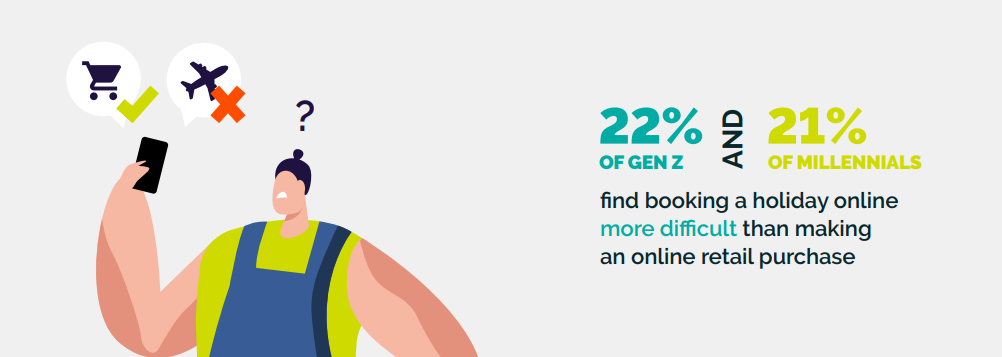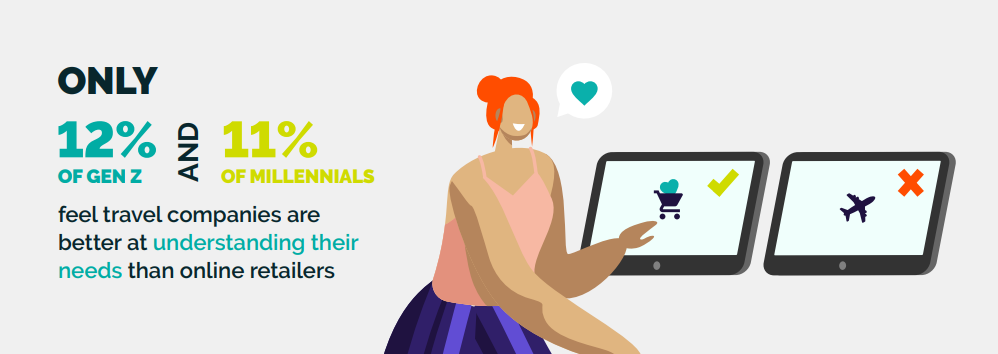Its study has revealed that only 12% of consumers feel that travel companies are better at understanding and offering what they want than online retailers. Even luxury travel businesses seem to be struggling to impress, as only 14% of holidaymakers with a household income of over GBP75,000 consider travel companies to be more capable of understanding their needs than retailers, it reveals.
The 'Digital holidaymaker trend report' surveyed 2,000 UK travellers in collaboration with Censuswide. It also indicates that the poor customer experience creates "purchase anxiety". Just 10% of consumers feel more confident completing an online booking for a holiday than making an online retail purchase. This is particularly the case for younger holidaymakers, with 22% of Gen Z (16-24 year olds) and 21% of Millennials (25-34 year olds) stating that booking a holiday online is more difficult than making an online retail purchase.
When it comes to brand loyalty, the study reveals the travel industry has some catching up to do, with one in five (20%) of respondents saying they don't have a preferred travel company, but online retailers they are loyal to. Particularly Gen Z and Millennial holidaymakers (25%) are less loyal to travel companies than online stores.
When examining the tactics that consumers find useful when making a leisure travel booking, user-generated content, such as reviews and photos, is most popular (33%), according to the report. Almost a third (30%) said they would welcome emails informing them that a holiday they had previously looked at has dropped in price. Gen Z and Millennials in particular expect a more tailored travel booking experience, such as a personalised website (24% versus 21%) and personalised product recommendations (21% versus 20%).

Personalisation is becoming increasingly demanded by consumers - the generic correspondence that marketers have long pushed out is no longer relevant. This is particularly true for high price items such as booking travel and the customer now expects to be valued at all stages of the journey with a personalised experience from all the brands they are engaging with.
"Despite having access to vast amounts of data, it's clear that many travel brands are failing to hit the mark in comparison to their retail counterparts when it comes to making customers feel understood," says Mike Austin, CEO & co-founder of Fresh Relevance.
"Evidently, travel brands should be leveraging the retail-style marketing tactics that resonate with consumers and help deliver a more customised experience for those researching trips. The brands that can provide consumers with useful information when it's most relevant will ultimately succeed in giving them the confidence to book," he adds.

A closer look at the Gen Z and millennial markets in the 'younger edition' of the 'Digital holidaymaker trend report' that focuses on consumers aged 16 to 34, shows that while millennials may have grown up with social media, they still value authentic connections and are far more likely than the average shopper to look for recommendations from their peers. Interestingly, travel agents remain relatively popular with this younger demographic, according to the report.
But, young consumers feel comfortable using new technologies in the research and booking process. Almost half of would feel comfortable using streaming services, such as Netflix, to find holiday inspiration, while one third would be interested in using virtual reality or chatbots when researching a holiday. In fact, only 14% wouldn't feel comfortable using any new technologies as part of the research process.
The research suggests that travel companies have room to get creative as new technologies emerge and younger generations increase in spending power. They need to avoid consumer frustration by delivering irrelevant and repetitive offers and above all provide a personalised, seamless shopping experience like what retailers offer today and what young consumers have come to expect.